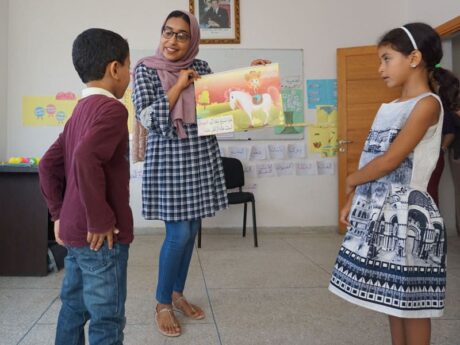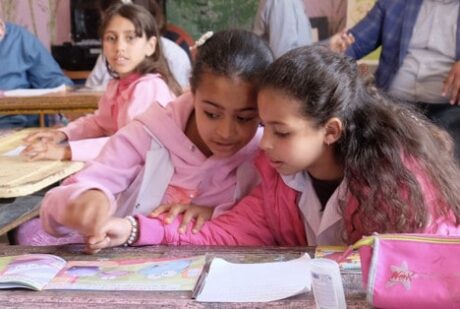"No passado, Eu não estava interessado em livros,”Admite Aicha Kefsaoui, um estudante do ensino médio no Ibn Ajroum em Tiflet, Marrocos. Mas isso mudou depois que os professores de Aicha foram treinados em técnicas para ajudar os alunos a melhorar sua compreensão de leitura.
Agora um amante de livro, Aicha diz: "Eu me pergunto como é que não prestei atenção à leitura antes?”
Esta é exatamente a reviravolta que o governo marroquino está buscando alcançar através do Leitura para habilidades acadêmicas e desenvolvimento individual em escolas de ensino médio (RASID) projeto.
Rasid é uma iniciativa de oito meses financiada principalmente pelo Ministério da Educação Nacional e Treinamento Vocacional do Marrocos com apoio dos EUA. Agência para o Desenvolvimento Internacional. O projeto é implementado pela Creative Associates International.
Rasid fornece aos professores e treinadores materiais e métodos para fortalecer habilidades críticas de compreensão de leitura no nível do ensino médio.
“Este programa aborda um problema sério no sistema do ensino médio: Habilidades de baixa leitura dos alunos e baixo desempenho geral da escola,”Explica Abdelkader Ezzaki, Chefe de Partido para Rasid.
Enquanto curta duração, A equipe do programa de Rasid relata que a iniciativa foi "muito bem -sucedida".
Baixas taxas de alfabetização sublinhadas para a necessidade de reforma educacional
O sistema educacional do Marrocos lutou com o baixo desempenho de leitura entre os alunos do ensino médio, Apesar dos altos números de inscrição.
De acordo com um Avaliação Nacional, apenas 25 por cento dos alunos da oitava série foram capazes de distinguir a idéia principal de um texto básico e somente 4 por cento poderia resumir seu conteúdo.
A questão é agravada quando os alunos com compreensão de leitura abaixo do grau começam a ensino médio e são esquecidos por professores que presumem que têm as habilidades de leitura esperadas de um aluno da sétima série.
Esses estudantes em dificuldades têm maior probabilidade de estar ausente e abandonar. Apenas 53 Porcentagem de alunos matriculados no ensino médio continuam no ensino médio, relatórios USAID.
Ciente dos desafios enfrentados por suas escolas, O governo marroquino iniciou uma série de reformas educacionais para atender melhor às necessidades dos alunos do ensino médio.
Uma dessas iniciativas foi o Melhorar a formação para o avanço da qualidade na educação nacional (ITQANE) projeto, implementado entre 2010 e 2014 pela USAID e criativo.
Durante o projeto Itqane, Tornou -se evidente que o aprendizado dos alunos foi impedido por fracas habilidades de leitura. Essa realização levou à criação de um programa piloto Para testar as ferramentas para melhorar a compreensão da leitura dos alunos.
Em colaboração com o Ministério da Educação Nacional e Treinamento Vocacional, Kits de leitura criativos desenvolvidos para professores de disciplinas, instruiu mestres treinadores e avaliou resultados de aprendizado dos alunos.
O piloto de leitura Itqane foi implementado em 35 escolas durante um período de oito semanas e resultou em melhor desempenho de leitura dos alunos. Os alunos também obtiveram uma pontuação mais alta em outras disciplinas, como matemática e ciências.
Depois de ver o sucesso do piloto de curto prazo, O Ministério da Educação Nacional e Treinamento Vocacional decidiu institucionalizar o programa como parte dos esforços contínuos de reforma educacional do governo.
O sucesso do programa de leitura piloto de Itqane lançou as bases para o lançamento do projeto Rasid em abril 2015.
Em direção a uma cultura de leitura
“Este programa está desenvolvendo uma cultura pedagógica educacional totalmente nova em torno da leitura,Diz o líder do projeto Rasid Abdelkader Ezzaki.
De fato, Rasid estabeleceu objetivos ambiciosos a serem alcançados em sua duração de oito meses. O objetivo final: Para estabelecer um sistema que permitirá que todos os professores do ensino médio do país melhorem as instruções de leitura entre as disciplinas, incluindo árabe, Francês, matemática e ciências.
Em colaboração com o ministério, USAID e Creative fortaleceram os guias de treinamento e treinamento existentes para ajudar os professores a integrar métodos de compreensão de leitura em suas áreas de assunto.
Junto, Eles também desenvolveram um mapa de currículo para ajudar os professores a identificar vínculos entre estratégias de leitura introduzidas nos treinamentos Rasid e o currículo existente do ensino médio.
Usando esses guias de treinamento, Rasid partiu para treinar professores de todas as regiões do país.
Através de uma série de oficinas de treinamento, 220 professores e 35 Os treinadores mestres do ministério foram ensinados a usar os links de guias e mapas de currículo.
“Eu acredito que me tornei um professor mais hábil,”Um professor de idioma árabe da Al Qods relatado após receber o treinamento, Observando que seus alunos estão mais atentos nas aulas e "são capazes de ler dentro de seus assuntos".
No final do treinamento, Os professores e os treinadores do Ministério estavam equipados para treinar cerca de um 27,000 professores durante o 2015-2016 e 2016-2017 anos escolares.
"Não é uma tarefa fácil,”Admite um professor em Ibn Ajroum. "No entanto, Decidimos tentar. ”
Girando a página
O Ministério da Educação e Treinamento Vocacional do Marrocos tem sido um líder e um campeão do projeto Rasid - desde o início até sua realização. O pessoal do ministério estava envolvido e envolvido no design do projeto, workshops e treinamentos.
À medida que o projeto de oito meses termina, há motivo para otimismo de que as baixas taxas de alfabetização no Marrocos melhorarão gradualmente.
Rasid equipou professores e treinadores com ferramentas que já estão mostrando a diferença nas salas de aula.
Professores da região piloto de Rabat já integraram o conteúdo e as estratégias do programa. Em workshops, Os professores demonstraram como estão implementando estratégias de programas e outras maneiras criativas de melhorar as habilidades de leitura dos alunos.
As autoridades regionais indicaram seu compromisso de realizar o treinamento de professores e acompanhamento na implementação da escola e da classe.
Parece que as escolas marroquinas estão girando a página em favor da leitura. Esse foco renovado é evidente em escolas onde os professores receberam o treinamento.
“Os professores estão organizando eventos para aumentar a conscientização sobre a importância da leitura. Professores e alunos estão organizando exposições dentro das escolas para aumentar a conscientização sobre a leitura. Eles estão organizando clubes de leitura, fazendo maior uso da biblioteca, Incentivando a leitura em casa e fazendo relatórios de livros,”Diz Ezzaki, Diretor de Projeto de Rasid.
“O programa,Ele conclui, "Está desenvolvendo uma nova cultura escolar em favor da leitura".

